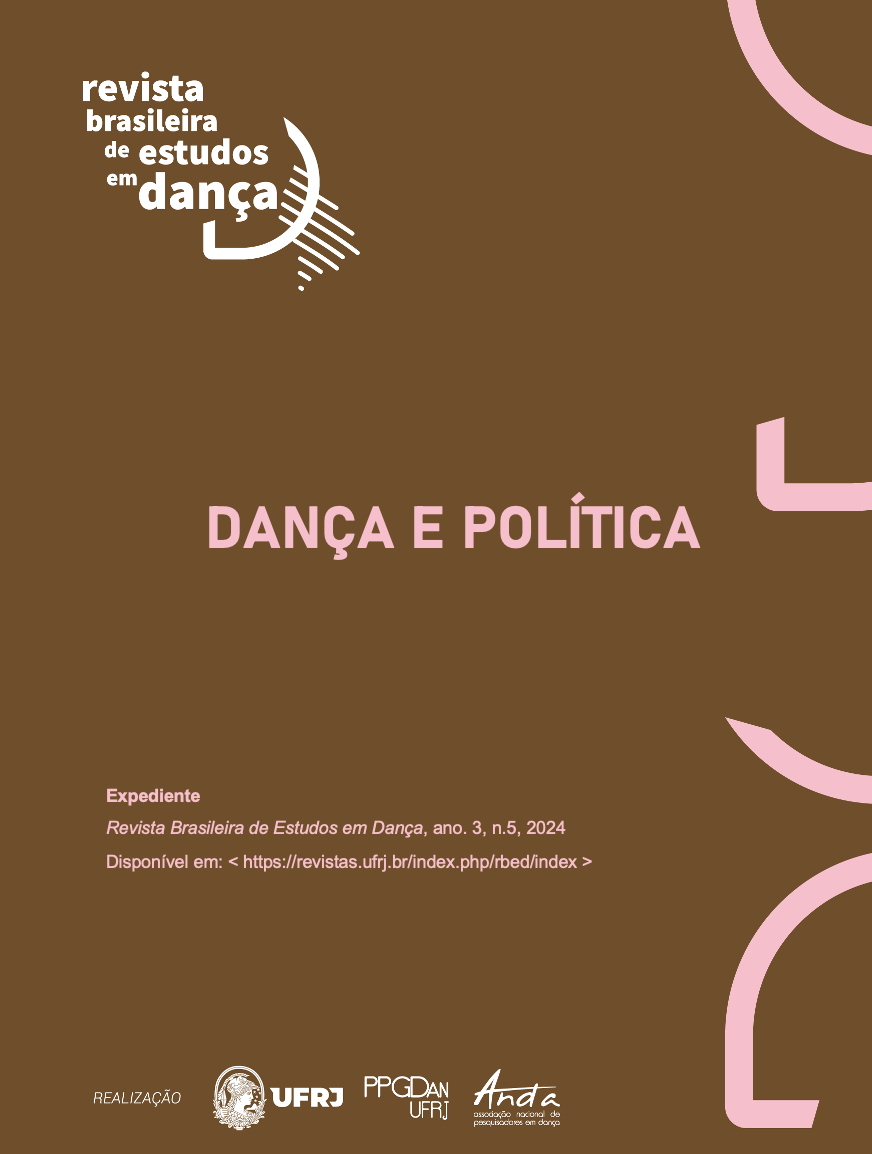Aerial Company Dance: a proposal to rescue black corporeality in the Gafieira Carioca Dance
DOI:
https://doi.org/10.58786/rbed.2024.v3.n5.64254Keywords:
Expressão Cultural, Samba de Gafieira., Batucar-cantar-dançar., DescolonizaçãoAbstract
This essay deals with the possibility of rescuing black corporeality in Rio de Janeiro's Gafieira Dance by addressing some of the social and cultural characteristics of the capitalist and colonial logic of domination in the colonial planning of bodies, the domination of their gestures and the exclusion of the African origin of the feelings present in bodies and cultural movements, such as Gafieira Dance. The essay focuses on the possibilities of unveiling and strengthening this dance and its potential as a language capable of creating cracks in systems of domination, by dialoguing with the thinking and some creative and pedagogical practices of choreographer and dancer João Carlos Ramos and his Cia. Aérea de Dança.
References
LIGIÉRO, Zeca. Batucar-Cantar-Dançar – desenho das perfomances africanas no Brasil - jan.-abr. - n. 1 - v. 21. Aletria, 2011.
MARTINS, Leda Maria. Performances do tempo espiralar, poéticas do corpo-tela [recurso eletrônico] / - 1. ed. - Rio de Janeiro: Cobogó, 2021.
COUTINHO, Marina Henriques. In: NOGUEIRA, Marcia Pompeo et.al. (org.). Pedagogias do desterro. Práticas de Pesquisa em Artes Cênicas. São Paulo: Hucitec Editora 2020.
PIRES, Isabelle Cristina da Silva. Uma febre dançante no Rio de Janeiro: cultura negra e associativismo recreativo. Mundos do Trabalho, Florianópolis | v. 14 | p. 1-7 | 2022. Resenha: PEREIRA, Leonardo Affonso de Miranda. A cidade que dança: clubes e bailes negros no Rio de Janeiro (1881-1933). Campinas: Editora da Unicamp; Rio de Janeiro: EdUERJ, 2020. 359 p.
RAMOS, João Carlos. Depoimento [jan.2024]. Entrevistadora. Paula Alvarenga Otero, Rio de Janeiro: UNIRIO, 2024. Entrevista concedida via Google Meet para o curso Possibilidades e limites da Pedagogia das Artes Cênicas em meio às ruínas do neoliberalismo. Professora: Marina Henriques Coutinho. Doutorado. PPGAC/UNIRIO.
ROLNIK, Raquel. Palestra realizada na Sessão 12 do curso A Colonialidade do Saber
Urbano, no Instituto de Pesquisa e Planejamento Urbano da UFRJ (IPPUR), no dia 13/11/2020. Vídeo disponível em:
https://www.facebook.com/ettern.ippur/videos/709508606353183
RUFINO, Luiz. Vence-demanda [recurso eletrônico]: educação e descolonização / Luiz Rufino. — 1. ed. — Rio de Janeiro: Mórula, 2021.
SANTOS, Boaventura de Sousa. A difícil democracia: reinventar as esquerdas. São
Paulo: Boitempo. 2016.
SODRÉ, Muniz. Samba, o dono do corpo. 2 ed. Rio de Janeiro: Mauad,1998.
Downloads
Published
How to Cite
Issue
Section
License
Authors who publish in the Revista Brasileira de Estudos em Dança are
responsible for the content of signed articles and retain copyright.
They grant the journal the right of first publication with the work simultaneously
licensed under the Creative Commons Attribution-NonCommercial 4.0 License
(Open Archives Initiative - OAI). This feature, used for open-access journals,
allows sharing work for non-commercial purposes and acknowledges
authorship. If the text is later published in another vehicle, the author
must inform that it was initially published as an article in the Revista Brasileira
de Estudos em Dança. Therefore, even if the journal owns the first publication,
authors are entitled to publish their work in institutional repositories or on
their personal pages, even if the editorial process has not been completed.
The journal reserves the right to make normative, orthographic, and grammatical changes to maintain the language standard, respecting the authorial style.

